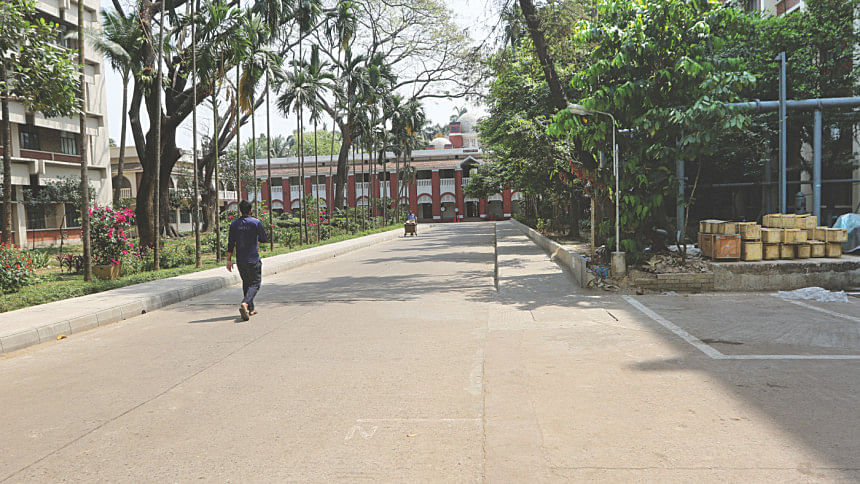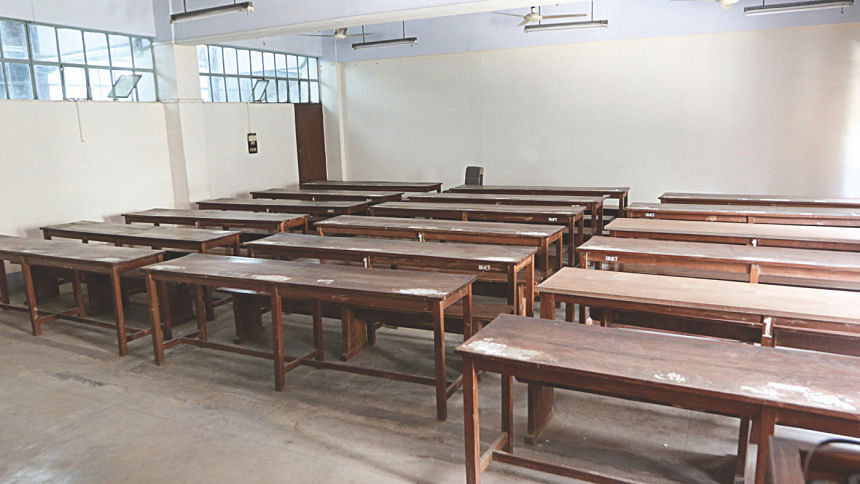An uncertain future for students amidst Covid-19 outbreak

"I find it unfortunate that the University decided to take such a decision without even considering the opinions of the students who are paying hefty fees for the whole semester. We only finished our midterms, which meant we had a few quizzes and a final left. This means that many students who had the chance to recover their grades won't get to anymore," opines Nazifa Raidah, student of Independent University, Bangladesh, in response to the cancellation of all final examinations by the university.
The global outbreak of Covid-19 has not left a single sector unharmed and the educational sector has faced a significant chunk of its effect. In accordance with the government, all educational institutes closed down from March 17, 2020 -- the students all over the country left in a cloud of uncertainty and a lot of unanswered questions.
Universities that were more than half way through the semester decided that the best course of action was to end the term and give out grades based on prior assessments.
"This decision was taken by Brac University because a lot of the students could not cope with the pressures of attending online classes, giving presentations online, and meeting deadlines for the assignments. Some of the faculties were being inconsiderate of the situation and the students claimed that they were not in the right state of mind since we can't really ignore what is happening to the world. Hence, the students complained to the Vice Chancellor," claimed Leena Kabir*, a current student of the university.

For other universities which still had a major portion of their academic term left, moving classes online remained the only option. Now, with online classes, the common problems remain. The teaching cannot be as hands-on and for lab courses, online classes really cannot do much, leaving a gap in knowledge for a lot of students. Moreover, in context to Bangladesh, other problems also arise.
According to Nazmus Sakib Nafiz of the University of Dhaka, attending online classes might not be possible for everyone since a lot of students have returned to their hometowns after the closure of the institutes. In public universities, a lot of students come from rural areas where proper infrastructure and internet access might not be present. These students might also have financial constraints holding them back from attending the classes, adds Maisha Tasnim Sneha, another student of the same university.
For Bangladeshi students abroad, there are other issues to take into consideration.
"I work part-time at a supermarket and since supermarkets are essential, they haven't closed down yet. However, it drains you physically and emotionally when you have to undertake extra precautions for yourself as well as for the customers and you are constantly reminded of the virus and its impact by the local news. It demotivates you to study when you come home after work. International students who don't work in essential services have lost their jobs and might have a hard time paying rent and daily costs," says Zarin Rayhana, currently studying in Griffith University, Australia. She adds, "A lot of the international students at universities here are going back home for a semester because of a lack of help by the government but not everyone can afford to go back and return again."
Some universities have been considerate enough in terms of housing for the international students but not everyone has been fortunate. Prachy Mahbub, who graduated in the middle of this pandemic from Mount Holyoke College, USA, shares, "It has been a rough couple of months. Our entire lives pretty much got upturned, especially for students whose homes are thousands of miles away. It has been especially difficult because we had to appeal to stay on-campus so we're not homeless."
For others, the plan might have been to return to Bangladesh but due to cancellation of flights or lockdown in their respective countries, they have been unable to do so.

"I was supposed to leave Malaysia right after my convocation. Around March 14, the situation became grave as the cases of Covid-19 kept on increasing. Our convocation was postponed indefinitely and from March 18, Malaysia went into a national lockdown which was later extended to April 14," says Shehrin Tabassum Odri, finishing her graduation in Segi University and Colleges, Malaysia. Being unable to catch an early flight out of the country before the lockdown, all she can do now is wait.
Apart from the educational aspect, it has also been a difficult situation for students who had graduations/convocations, summer internships, or booked and paid-for flights back home. "I felt very disheartened because we worked for three whole years for this one day. Since it has been postponed indefinitely, there is no guarantee now that our convocation will take place," further remarks Shehrin.
"I was supposed to go for my internship abroad this summer and I started applying from February but the pandemic had already started impacting the countries I was aiming for. It is concerning because the situation will remain like this for at least a month or two. Sitting back and doing nothing is building up a lot of anxiety in me. If this continues, we might have to graduate in spring whereas I was supposed to be done by fall," adds Leena.
This late graduation is a concern of many final-year students. "A big concern for many final-year students is finishing their thesis or project. Right when I was starting to get a hold of the rigours of thesis work, the recent outbreak ran its course and stopped it dead on its tracks. Many of these complex, computational problems and laboratory analysis can only be done in a University environment. Here, online classes or 'work from home' is not an option. My graduation will most likely be delayed, which will ruin my chances of catching the September sessions in the UK which I wanted to apply for," laments Farhan Rahman, a North South University student. Public universities in the country may also face the added issue of session jams.
Moving down to schools, students are facing a lot of similar concerns. For English medium students, cancellation of the O and A Level examinations poses a lot of unease among the students especially in regards to grading since it will now be provided based on prior mock tests taken by the school and performances of the students throughout the year.
"You might argue that mocks are a good representation but there are students who do not take mocks that seriously and end up performing better on the main exam. Dissatisfactory grades can make university applications look bad where you might need to retake the units, causing an unwanted gap year," says Osaman Bin Ahmed, a May 2020 A Level candidate.
HSC candidates on the other hand are left with a lot of uncertainty as no concrete announcements have been made yet (at the time of writing this) in regards to the dates of their examinations.
According to HSC candidate Iflaj Nashita Taslim, "The whole situation has left the HSC examinees in a dilemma. Right now, all we can do is wait and keep preparing ourselves for the exam and hope that the government takes the right decision based on the situation."
"If the exams are cancelled and the students are judged based on their test results, many potential students might not even be able to sit for the admission tests of their dream universities. On the other hand, if the exams are held after the situation returns to normal, we might not get enough time to prepare for the admission tests. If the admissions are also delayed to give us more preparation time, it will result in the delay of all the later activities as well," she adds.
During these unpredictable times, it's important to try and look at the bigger picture. "It's a setback for all of us but I'm certain we will, collectively, bounce back from this," says Farhan, adding his two cents on the situation.
*Name has been changed for privacy
Send your queries to Tasnim Odrika at [email protected]

 For all latest news, follow The Daily Star's Google News channel.
For all latest news, follow The Daily Star's Google News channel. 



Comments